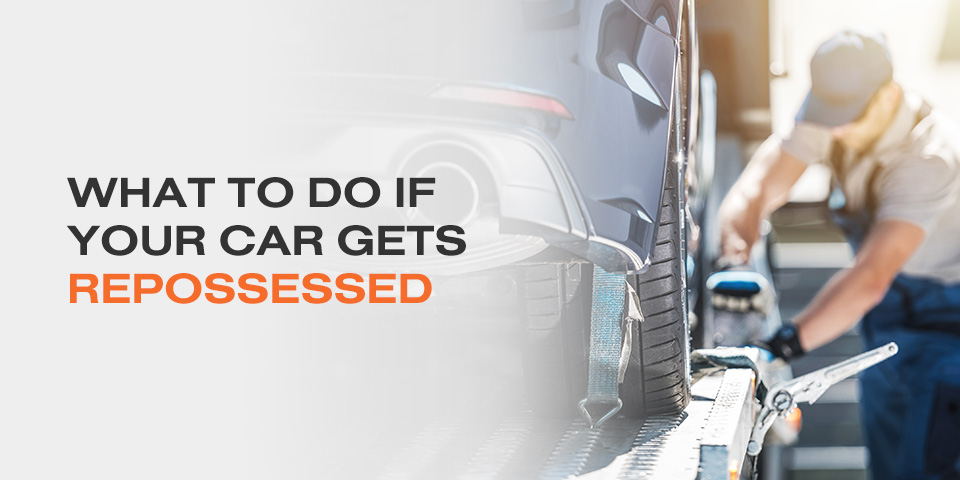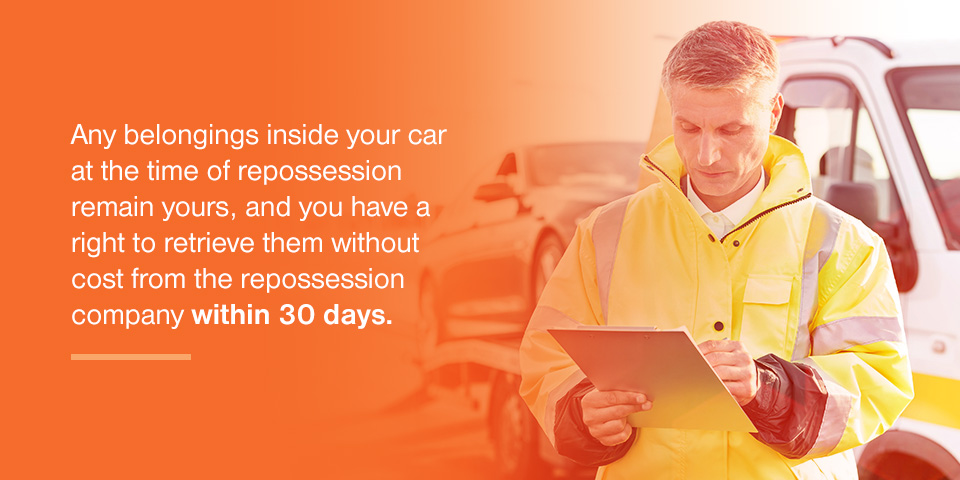
What to Do If Your Car Gets Repossessed: Essential Steps and Rights
When times are tough financially, it can feel like you’re juggling an impossible number of bills. The threat of car repossession may be a daily stressor in such circumstances. To learn more about how car repossession works, read through this article and find out what to do when your car gets repossessed.
What It Means When a Car Is Repossessed?
When a car is repossessed, it means that the borrower has missed one or more payments on their car loan. Unless you paid for your car outright, most vehicle purchases involve loans that allow you to pay for a vehicle over time. When you take a loan out for a car, you sign a legally binding agreement confirming you will pay the full sum of the loan on time. Payments are often made in monthly installments.
If you miss a payment, the lender can rightfully repossess your car. A missed payment is defined as more than 30 days past the payment date. Most lenders don’t proceed with repossession until the borrower has missed two or three consecutive payments.
Depending on the lender’s tolerance, they may also contact you for an explanation or encourage prompt payment. If they cannot reach you or haven’t received an explanation, and you’ve defaulted multiple times, they’ll likely repossess your vehicle. As such, it’s essential to reach out to the lender if you can’t make a payment on your loan to avoid this.
What Happens If My Car Gets Repossessed?
Before a repossession, you’ll likely receive a notice of outstanding payments on your loan that you should pay or face repossession. This notice may come to you through phone, email or mail. Yet, when a lender decides to repossess your car, they can do so without warning.
After the repossession, the lender is responsible for notifying you of the repossession and any intention to sell. Selling notices often include information on what you must do to keep the vehicle. The three types of such notices include:
- Acceleration notices: The lender issues this notice to the borrower, informing them of their defaulted loan and intention to sell. This notice also informs the borrower they have to pay the remaining loan balance. You can respond to this notice by negotiating an alternate payment plan, but you should do so immediately after receiving the notice.
- Opportunity to cure: This notice informs the borrower what they must do to keep the vehicle by a specific date and redeem the loan.
- Post-repossession notice: Lenders must provide a notice at least 10 days before they plan to sell the borrower’s vehicle.
Lenders typically contract repossession agencies to collect cars with outstanding payments to carry out the repossession. Repo workers start with your home address when coming to collect your vehicle. The Federal Trade Commission states lenders and repo workers cannot breach the peace when collecting your vehicle. What constitutes breaching the peace varies with different states.
There are no legitimate car repossession loopholes to get you out of a tough situation. However, if a repo company breaches the peace by yelling, making threats or disrupting your property, you may have grounds to sway future court decisions in your favor.
If they don’t find your car at your home, they may look at your place of work or nearby grocery stores, finding such information through the lender. They may wait for you to pull your car out of the garage and follow you until you park and get out. Once you leave the car, the repo worker can retrieve it.

Common Questions About Car Repossession
Repossession can feel like you’ve been broadsided, so it makes sense if you have questions about the car repossession process. Here are some common questions consumers have about the car repossession process.
-
If My Car Gets Repossessed, Can I Get It Back?
- It’s possible to get your car back after repossession. However, you have a limited amount of time to do so. Contact the lender soon after the repossession to discuss the terms of retrieving your car.
- Getting your car back varies with each lender but usually involves paying off the remaining loan balance in full within a certain period. Some lenders may allow you to catch up on overdue payments to redeem the defaulted loan. If you’re unable to meet the lender’s terms for loan reinstatement, they will proceed to sell the vehicle and recoup their losses.
-
If Your Car Gets Repossessed, Do You Still Have to Pay?
- Your lender may sell your car at an auction after repossessing your vehicle. If they don’t recoup the total cost of the vehicle, you are responsible for the remaining balance. The lender can take you to court if you refuse to pay. You will also be responsible for other fees associated with repossession, whether or not the lender recoups the total cost of the vehicle in selling.
-
How Much Will I Owe Following a Car Repossession?
- A lender will let you know how much to pay to get your car back after a repo. This amount can often be more than solely the remaining loan balance. Of course, you will owe the principal amount of the car loan, but you are also accountable for any accrued interest. Keep these hidden costs in mind if you are on the fence about purchasing your car back:
- Repossession fees: It’s possible a lender will charge you for costs associated with a repo company coming to pick up your automobile. This is influenced by how far a crew needs to drive and if any special equipment is used.
- Selling costs: The lender of your car loan might pay to get your repossessed vehicle entered into an auction or placed in online or print advertisements. These fees can be incorporated into the equation to get your car back.
- A lender will let you know how much to pay to get your car back after a repo. This amount can often be more than solely the remaining loan balance. Of course, you will owe the principal amount of the car loan, but you are also accountable for any accrued interest. Keep these hidden costs in mind if you are on the fence about purchasing your car back:
-
My Car Was Repossessed. What Are My Rights?
- Repossession laws vary from state to state. Most laws prohibit repo companies from using force or threats to collect vehicles. They can collect your car if it is on your driveway without warning, but not if it is inside a closed garage.
- You can file a legal complaint if you believe your car was wrongfully repossessed. Before doing so, review the loan agreement terms and consult with a consumer law attorney to see if the lender or repo agency violated your consumer rights or the loan agreement terms.
-
If My Car Is Repossessed, Can I Get My Belongings?
- Any belongings inside your car at the time of repossession remain yours, and you have a right to retrieve them without cost from the repossession company within 30 days.
- Note that the process for getting items back post-repossession looks different based on the lender. You will need to plan a time to visit the location where your vehicle was taken by the repo company. Individuals can do this by calling the lender or the repo company directly and asking for an address. It is best to agree on a time that is as soon as possible for the sake of your personal belongings — you don’t want too much time to pass and items to get discarded for a sale.
- Unsure if you had items in your vehicle? Most repossession companies will log personal belongings left inside a car or truck at the time of the pickup. This includes electronics, clothing, grocery bags, shoes and household items, to name a few examples. Plan ahead for the retrieval meeting by locating proof of identification. Depending on the size of the repo company, they will likely want to see a valid ID as proof that the items belong to you.
-
How Long Until Your Car Gets Repossessed?
- Repossession can happen after one missed payment. Lenders can legally repossess your vehicle days after you’ve missed your first payment. In most cases, lenders will allow borrowers to pay before taking action.
-
How Long Does It Take to Recover From a Repossession?
- After the lender repossesses your vehicle and informs creditors, the creditor can send your loan to collections. This could severely damage your credit and show up on your credit report for seven years.
-
How Soon Can I Get My Repossessed Car Back?
- This varies based on a couple of factors, including the laws in your state, the lender’s policies and your specific situation. Here are a few considerations:
- Grace period: A lender could give you a period of time to catch up on late payments before selling. Following the lender’s wishes as soon as possible can help you get your vehicle back before any legal action is taken.
- Payment: While rare, repossessions can happen as a result of forgetting to make payments due to extended travel for work or school. Paying off your debts in full gets your vehicle back to you quickly.
- State laws: Some states have unique requirements for repossession procedures. The timeline for you getting your vehicle back may depend on where you live and actions that must be completed by you or the lender.
- Contact your lender: Your lender has a great deal of control during a repossession. Speak with the lender as soon as your vehicle is taken to understand your options.
- Reinstatement options: Covering any past-due car loan payments can put you in good standing with your lender and help you reach the terms of your original loan agreement. Reinstatement options are not always available.
- This varies based on a couple of factors, including the laws in your state, the lender’s policies and your specific situation. Here are a few considerations:
How to Recover From a Repossession
After a lender repossesses your vehicle, your main option is to renegotiate a payment plan with your lender to bring the payments back up to date or pay the remaining balance in full. Still, you may want to weigh the pros and cons of getting your car back by asking:
- Can I afford insurance, maintenance and gas if I get the car back?
- Do I have access to affordable and convenient public transportation?
- Is it worthwhile to file for bankruptcy and avoid repossession?
- Should I trade in my car for a more affordable option?
Since your credit takes a significant hit from repossession, recovering from repossession involves improving your credit score. For more insights on how different types of repossession can affect your credit, consider reading about whether a voluntary car repossession can save your credit score. While you’ll have to wait seven years before you’re fully cleared of the repossession, you can take steps to improve your score in the meantime. Make sure you pay other bills on time and minimize debt. If you do so, your credit score will be in great shape when the repossession comes off the report.
Contact Us for Repossession Equipment
If you’re interested in car repossession equipment, we welcome you to visit our contact us page to speak with one of our experts!